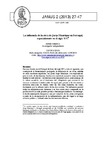Mostrar o rexistro simple do ítem
La influencia de la obra de Jorge Manrique en Portugal, especialmente en el siglo XVI
| dc.contributor.author | Amaral, Rubem | es_ES |
| dc.date.accessioned | 2014-09-24T08:16:27Z | |
| dc.date.available | 2014-09-24T08:16:27Z | |
| dc.date.issued | 2013 | es_ES |
| dc.identifier.citation | Janus Estudios sobre el Siglo de Oro, 2013, 2: 27-47. ISSN: 2254-7290 | es_ES |
| dc.identifier.issn | 2254-7290 | es_ES |
| dc.identifier.uri | http://hdl.handle.net/2183/12653 | |
| dc.description.abstract | [Resumen] Fue muy honda, en el Portugal de fines del siglo XV y todo el siguiente, que corresponde al Renacimiento portugués, la influencia de las obras, además de otros escritores españoles, del poeta Jorge Manrique, con especialidad, pero no solo, de las famosas Coplas a la muerte de su padre, como se busca resaltar en este artículo. Tal tendencia fue estimulada por el gran prestigio de la cultura española, por el fenómeno del bilingüismo que caracterizó los círculos cortesanos e intelectuales de aquel país gracias a las frecuentes y estrechas relaciones de familia entre las dos casas reinantes, así como, finalmente, por la efímera unión de las dos coronas. Tal influencia penetró todas las manifestaciones literarias y se hizo sentir muy claramente en la producción de los más grandes poetas y dramaturgos lusitanos. Sin embargo, la huella manriqueña desaparece casi por completo de las letras portuguesas a partir de la recuperación de la independencia, que dió lugar a un largo divorcio político y cultural entre las dos naciones ibéricas. | es_ES |
| dc.description.abstract | [Abstract] In the Portugal of the end of the 15th century and the entire ensuing hundred years, corresponding to the Portuguese Renaissance, the influence of the works, besides other Spanish writers, that of the poet Jorge Manrique, was very deep, especially, but not only, of the famous Stanzas to the death on his father, as this article seeks to highlight. Such trend was enhanced by the great prestige of the Spanish culture, the phenomenon of bilingualism that characterized the court and intellectual circles of that country thanks to the frequent and tight family relations between the two reigning houses, as well as, eventually, the ephemeral union of the two crowns. It pervaded every literary manifestation and was clearly felt in the production of the greatest Portuguese poets and playwrits. Nevertheless, Manrique’s trace vanishes almost completely from the Portuguese letters following the recovery of the independence, which gave way to a long political and cultural divorce between the two Iberian nations. | es_ES |
| dc.language.iso | spa | es_ES |
| dc.publisher | Universidade da Coruña | es_ES |
| dc.subject | Portugal | es_ES |
| dc.subject | Literatura portuguesa | es_ES |
| dc.subject | Renacimiento portugués | es_ES |
| dc.subject | Literatura española | es_ES |
| dc.subject | Bilingüismo | es_ES |
| dc.subject | Jorge Manrique | es_ES |
| dc.subject | Coplas a la muerte de su padre | es_ES |
| dc.subject | Portuguese literature | es_ES |
| dc.subject | Portuguese Renaissance | es_ES |
| dc.subject | Spanish literature | es_ES |
| dc.subject | Bilingualism | es_ES |
| dc.title | La influencia de la obra de Jorge Manrique en Portugal, especialmente en el siglo XVI | es_ES |
| dc.type | info:eu-repo/semantics/article | es_ES |
| dc.rights.access | info:eu-repo/semantics/openAccess | es_ES |






